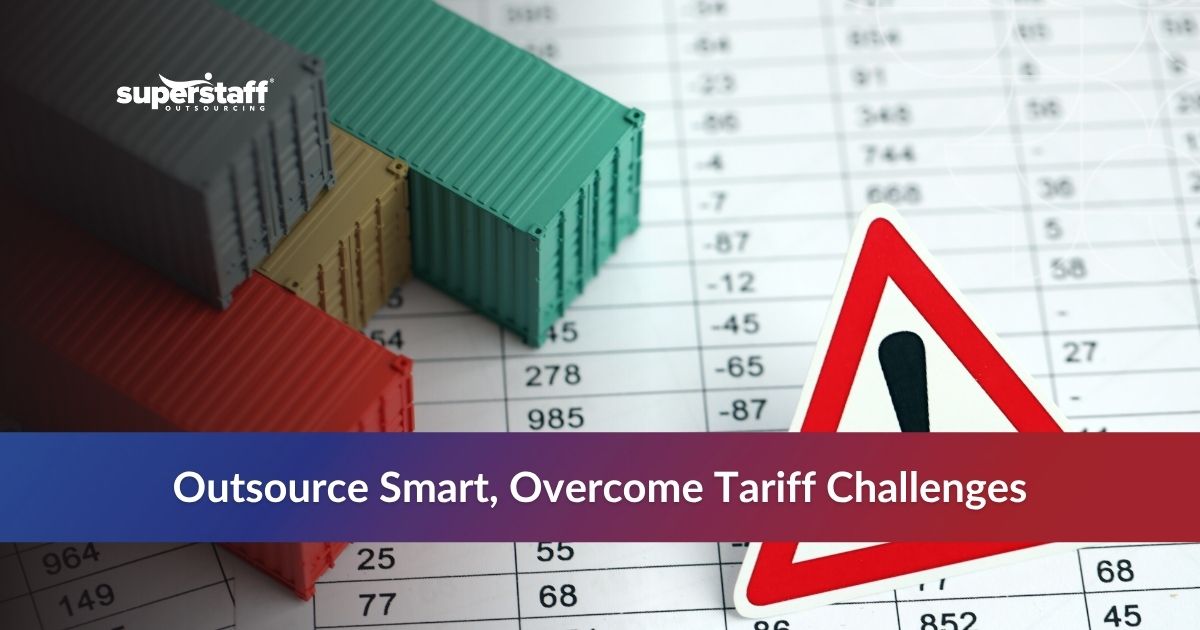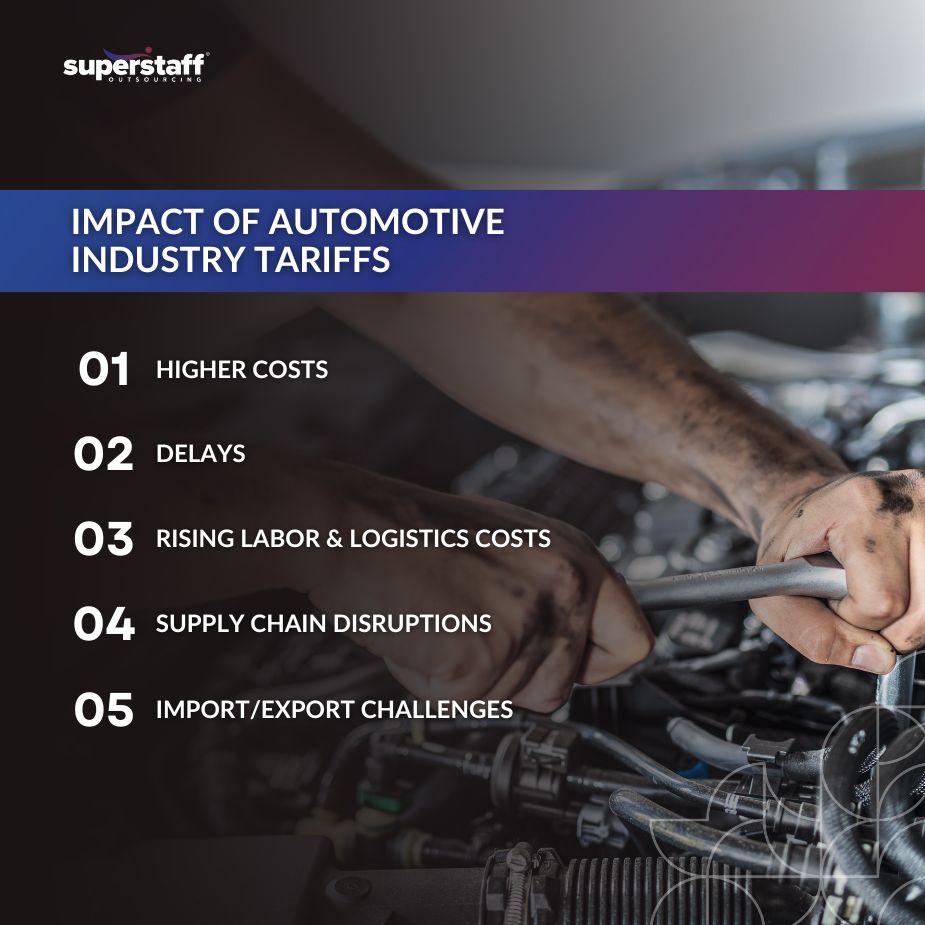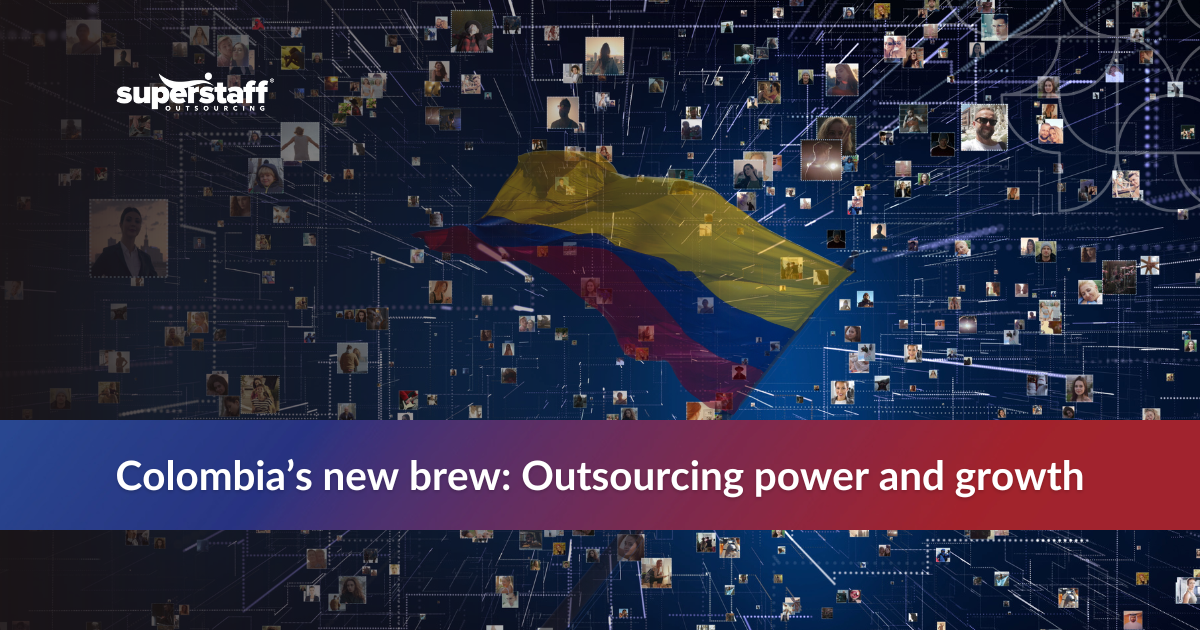
New tariffs are making it more expensive to build cars. From parts and materials to shipping and labor, automotive industry tariffs are raising costs across the board. This puts extra strain on car makers who are already working hard to stay on schedule and meet customer demands.
With so much uncertainty in global trade, many companies are turning to outsourcing as a smart way to lower costs and stay flexible. By handing off tasks such as customer service, back-office work, and supply chain coordination, automakers can shift gears and continue driving forward, no matter how rough the road gets.
In the sections ahead, we’ll explore managing rising automotive tariffs and how outsourcing helps car companies remain steady, cut costs, and maintain control when trade winds begin to shift.

Tariff Increases Are Disrupting the Global Automotive Value Chain
Tariffs are causing delays and higher costs at every step of the production process. For car manufacturers who already work with complex global supply chains, these new tariffs add even more challenges.
For example, U.S. automakers are expected to pay an extra $108 billion in costs due to a 25% tariff on imported auto parts. This means higher prices for materials and longer wait times for essential components, making it harder to keep production on track and costs under control.
- Higher Import/Export Duties on Parts and Materials – Essential components are becoming more expensive as import and export duties rise, affecting everything from body panels to high-tech sensors.
- Delayed Shipments and Increased Lead Times – Border slowdowns and compliance checks driven by tariffs are extending lead times, complicating just-in-time production schedules.
- Rising Labor and Logistics Costs in Key Manufacturing Regions – As production shifts in response to trade changes, labor and shipping expenses are going up, particularly in regions where automotive industry tariffs are hitting hardest.
To stay ahead, manufacturers need a smarter way to manage operations and keep costs in check.
Strategic Outsourcing: A Smart Way to Cut Costs and Stay Flexible
As automotive industry tariffs continue to increase costs, auto industry cost-cutting strategies like outsourcing provide manufacturers with an innovative and flexible way to stay ahead. By outsourcing non-core tasks to trusted partners, companies can reduce expenses without compromising their primary production work.
-
Move Customer Support and Admin Tasks Offshore
Outsourcing everyday support work, like answering customer questions or handling admin tasks, to more affordable regions helps cut costs and keeps the business running smoothly.
-
Outsource Finance and Accounting Work
Tasks such as bookkeeping, invoicing, and payroll can be time-consuming, but they don’t need to be handled in-house. Outsourcing these jobs frees up internal teams to focus on higher-value work.
-
Relocate Non-Essential Operations to Low-Tariff Countries
By relocating certain operations to countries with more favorable trade agreements, companies can mitigate the full impact of automotive industry tariffs and operate more efficiently.
These smart outsourcing steps help reduce the pressure of rising costs while giving companies the flexibility to adjust and grow in changing global conditions.
Outsourcing Amid Rising Automotive Industry Tariffs
With automotive industry tariffs shaking up global trade, maintaining a smooth supply chain has become a significant challenge. However, with the right outsourcing support, automotive companies can regain control and keep operations moving smoothly.
-
Stay Ahead with Real-Time Supply Chain Updates
Outsourcing partners with logistics expertise offer up-to-the-minute updates on disruptions, helping companies identify problems early and respond quickly to avoid more significant setbacks.
-
Simplify Global Supplier Coordination
When professionals handle the back-and-forth with international suppliers, including paperwork and shipping updates, delays caused by tariff rules or trade changes can be reduced.
-
Get Smarter with Demand Forecasting and Inventory Support
Outsourcing teams can help predict demand and manage stock levels more accurately, so even if tariffs shift delivery times, you’re ready to respond without missing a beat.
By boosting visibility and enhancing communication, outsourcing enables automakers to build a stronger, more responsive supply chain, especially in uncertain times.
Automotive Companies Also Benefit from Outsourcing Customer-Facing Operations
Tariffs don’t just affect production—they can ripple all the way to the customer experience. By outsourcing customer support and related functions, companies can maintain service levels even amid disruptions tied to automotive industry tariffs.
- Multilingual Support for Global Customers: A global market demands multilingual service capabilities that can be cost-prohibitive in-house.
- 24/7 Service Coverage Without Excessive Labor Costs: Outsourcing enables around-the-clock support without the burden of expanding internal teams.
- Streamlined Warranty and Claims Processing: Faster handling of claims helps ease customer frustration during production delays or parts shortages linked to tariffs.
This operational flexibility ensures that customer loyalty isn’t lost, even when external conditions are unpredictable.
Outsourcing Helps Automotive Firms Stay Agile in Changing Trade
As automotive industry tariffs continue to disrupt global trade, outsourcing allows automotive companies to stay agile and responsive. By shifting non-core tasks to external partners, businesses can scale operations quickly without the lengthy hiring processes, ensuring they can adjust to changes in demand or supply chain delays caused by tariffs.
Outsourcing also provides access to specialized expertise in logistics, customer service, and other areas that improve efficiency. With fixed contracts, companies can better manage costs, even as tariffs fluctuate. This flexibility enables automotive firms to stay competitive and maintain stability in an unpredictable trading environment.
Stay Agile, Stay Ahead in a Changing Trade World
As automotive industry tariffs reshape global supply chains, outsourcing offers a strategic way for companies to reduce costs, maintain agility, and ensure business continuity. By moving non-core tasks to trusted partners, automotive businesses can stay focused on what matters most—building quality vehicles and delivering value to customers.
Looking ahead, strategies for managing automotive tariffs in 2025 will be crucial for businesses navigating an increasingly unpredictable global trade environment. Outsourcing allows manufacturers to remain responsive, cut costs, and adapt quickly to shifting trade policies and tariffs.
Discover how SuperStaff’s outsourcing solutions can help your automotive business lower expenses, improve responsiveness, and stay competitive in the face of rising tariffs and trade pressures. Contact us today to learn more.






